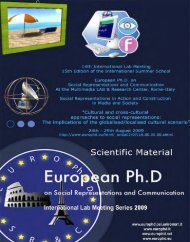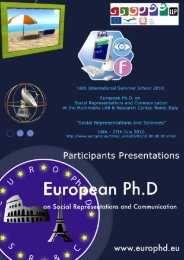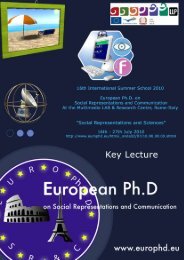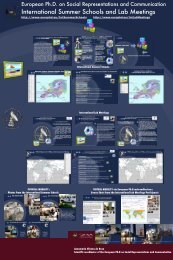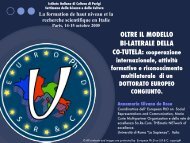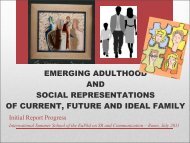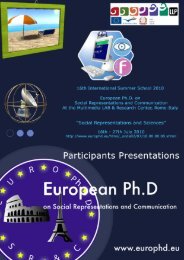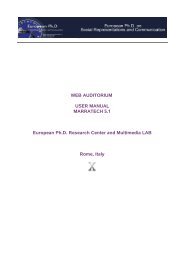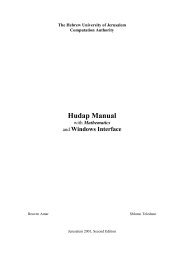The "boomerang" effect of the radicalism in discourse analysis
The "boomerang" effect of the radicalism in discourse analysis
The "boomerang" effect of the radicalism in discourse analysis
You also want an ePaper? Increase the reach of your titles
YUMPU automatically turns print PDFs into web optimized ePapers that Google loves.
<strong>The</strong> subject's role <strong>in</strong> a radical "cont<strong>in</strong>gentism" perspective.<br />
It may be asked what may be <strong>the</strong> role - <strong>in</strong> a perspective or radical "congentism" - <strong>of</strong><br />
<strong>the</strong> <strong>in</strong>dividual: that <strong>of</strong> act<strong>in</strong>g entity (namely an actor <strong>of</strong> <strong>the</strong> <strong>discourse</strong>, producer <strong>of</strong><br />
mean<strong>in</strong>g, a "<strong>discourse</strong> producer" or at least a "<strong>discourse</strong>-user") or that <strong>of</strong> an acted-upon<br />
entity (a "by-<strong>discourse</strong>-used, an entity def<strong>in</strong>ed by <strong>the</strong> <strong>discourse</strong>, which only <strong>the</strong> analysts<br />
can reveal)? In order to reply several po<strong>in</strong>ts must be considered.<br />
One <strong>of</strong> <strong>the</strong> ma<strong>in</strong> aspects <strong>of</strong> <strong>the</strong> RDA is to deny <strong>the</strong> existence <strong>of</strong> an <strong>in</strong>ternal guide <strong>of</strong><br />
cognitive type that orients <strong>the</strong> social <strong>in</strong>dividual's behaviour (Potter and We<strong>the</strong>rell, 1987;<br />
Potter, 1996; Potter and Edwards, 1999). To a typically cognitivist conception, <strong>the</strong> RDA<br />
opposes <strong>the</strong> assumption that <strong>the</strong> same cognition may be a characteristic <strong>of</strong> <strong>the</strong> social action<br />
(Potter and Edwards, 1999).<br />
“DP rejects perceptual-cognitivism <strong>in</strong> favour <strong>of</strong> a systematic reformulation <strong>of</strong> cognition as a feature <strong>of</strong><br />
participants’ practices.”<br />
(Potter & Edwards, 1999, p. 449)<br />
<strong>The</strong> idea that "cognitive facts" are an action (and more precisely a "performative"<br />
activity <strong>of</strong> discursive type) is moreover closely l<strong>in</strong>ked to <strong>the</strong> assumption <strong>of</strong> <strong>the</strong> variability.<br />
On vary<strong>in</strong>g <strong>the</strong> contexts <strong>the</strong> social practices vary also.<br />
“We merely have to deal with a socially occasioned variability from one time to ano<strong>the</strong>r.”<br />
(Middleton & Edwards, 1990, p. 43)<br />
Accord<strong>in</strong>g to this assumption <strong>the</strong> behaviours, <strong>the</strong> beliefs and <strong>the</strong> representations<br />
change as a function <strong>of</strong> <strong>the</strong> "performative" activity <strong>of</strong> <strong>the</strong> <strong>discourse</strong> and, consequently, <strong>of</strong><br />
<strong>the</strong> cont<strong>in</strong>gent aims l<strong>in</strong>ked to a particular context. However, <strong>the</strong> <strong>discourse</strong> (with its<br />
emerg<strong>in</strong>g properties, namely <strong>the</strong> cognition) are not considered only as a cont<strong>in</strong>gent product<br />
l<strong>in</strong>ked to a specific <strong>in</strong>teractive situation, it reproduces <strong>the</strong> existence <strong>of</strong> more ample<br />
<strong>discourse</strong>s circulat<strong>in</strong>g <strong>in</strong> <strong>the</strong> social sphere (<strong>the</strong> "<strong>in</strong>terpretative repertoires")<br />
Through <strong>the</strong> <strong>in</strong>terpretative repertoires, <strong>the</strong> RDA b<strong>in</strong>ds <strong>the</strong> <strong>in</strong>dividual to <strong>the</strong> social. In<br />
pursu<strong>in</strong>g his aims (consciously or unconsciously) <strong>the</strong> <strong>in</strong>dividual uses <strong>the</strong> rhetorically<br />
proven and coherent discursive structures which are reified <strong>in</strong> <strong>the</strong> language and which are,<br />
<strong>in</strong> certa<strong>in</strong> way, suggested by <strong>the</strong> micro-context <strong>of</strong> <strong>the</strong> <strong>in</strong>terpersonal relation.<br />
This conception, although extremely articulated, seems to raise a problem.<br />
Paradoxically, <strong>in</strong> criticis<strong>in</strong>g <strong>the</strong> cognitivist ontology, <strong>the</strong> RDA ends up by creat<strong>in</strong>g a<br />
new ontology, this time <strong>of</strong> contestualist type, based on two complementary assumptions:<br />
all is a social practice, all is relative and variable.<br />
What plac<strong>in</strong>g has <strong>the</strong> subject with<strong>in</strong> this new ontology? In our op<strong>in</strong>ion, <strong>in</strong> <strong>the</strong> RDA <strong>the</strong><br />
subject:<br />
(a) is transformed, from constructor <strong>of</strong> reality, <strong>in</strong>to construction <strong>of</strong> reality;<br />
(b) from speak<strong>in</strong>g subject, it transformed <strong>in</strong>to subject constantly spoken to by<br />
contextuallly variable micro-<strong>discourse</strong>s.<br />
<strong>The</strong> <strong>in</strong>dividual's role, which <strong>in</strong> <strong>the</strong> constructivist approach was <strong>in</strong>tended to be actor<br />
and protagonist <strong>in</strong>tentionally active <strong>in</strong> <strong>the</strong> scenario <strong>of</strong> <strong>the</strong> social life, becomes <strong>in</strong> <strong>the</strong> RDA<br />
problematical. On <strong>the</strong> one hand <strong>the</strong> <strong>in</strong>dividual seems to be conceived as a rhetorical<br />
19




